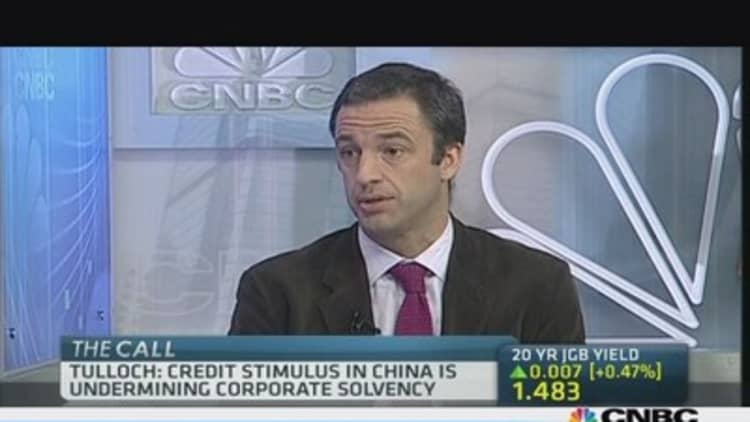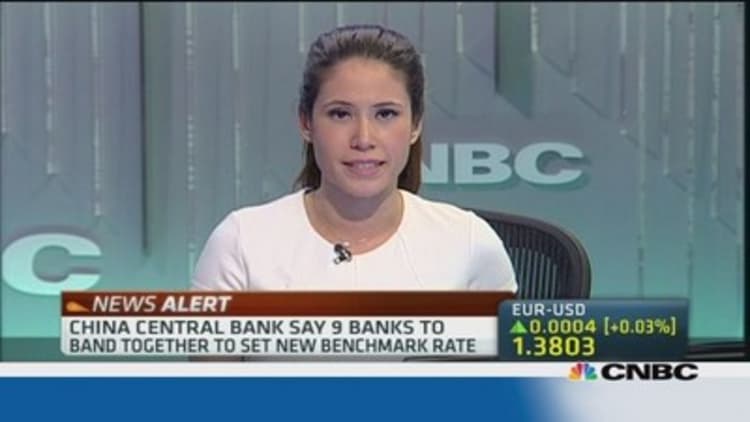Asian stocks were dealt a blow on the final trading day of the week as concerns over a repeat of June's credit crunch in China overshadowed gains on Wall Street.
Japan's fell to a two-and-a-half-week low, the Shanghai Composite declined to a seven-week low while South Korea's Kospi and Indian shares were both modestly lower. Australia's was the region's outperformer, closing at a new five-year high.
Meanwhile, the U.S. dollar was sold off against a basket of currencies. The greenback hit a fresh two-year low against the euro, two-week low against the yen and a two-month low against Indonesia's rupiah.
(Read more: Carry trade back in fashion as easy money prevails)
| Asia Major Index Performance | Last | Today's change | 1 week change | MTD change | YTD change |
| Nikkei | 14088.19 | -2.75% | -3.25% | -4.37% | 35.53% |
| Shanghai Composite | 2034.39 | -1.45% | -2.77% | -3.38% | -6 |
| S&P ASX 200 | 5386.3 | 0.25% | 1.22% | 2.91% | 15.86% |
| Kospi | 2132.95 | -0.60% | -0.88% | 1.36% | 1.87% |
China credit fears resurface
China's short-term money market rates continued to spook investors after the 7-day repo rate, a key gauge of liquidity, rose to 4.8 percent on Friday while the overnight repo rate jumped to 7.5 percent, its highest level since June.

The central bank tightened liquidity by withdrawing cash from the system for the third time in two weeks on Thursday. Analysts attribute the measure to rising home prices, hot money flowing into banks and the fact that recent data shows strength returning to the economy, which could be giving the PBOC more room to tighten.
"Asia is being dictated by China and moves in money markets and equities. Money markets could feasibly continue to move higher in the short term, but I've full faith the PBOC will have an upper limit in mind where it will provide the necessary liquidity to interbank markets, however for now the markets seem more sanguine ahead of the weekend," said Chris Weston, market strategist at IG.
(Read more: Why the write-off by China banks is positive)
Nikkei 2.7% lower
Japan's benchmark index widened losses after the yen rose to 97 per dollar, experiencing its biggest one-day fall in over two months. Meanwhile, the nationwide core consumer price index (CPI) climbed 0.7 percent in September from a year earlier, in line with expectations.
"You're seeing food and energy price inflation, wage deflation and consumer durable goods deflation. It's the worst possible inflation for getting a sustained recovery because it makes the consumer feel bad," said Paul Donovan, managing director and deputy head of global economics at UBS.
(Read more: Authors accuse Apple of destroying Japan's techs)
In earnings news, Apple component maker Murata Manufacturing ended 2.2 percent higher following an earlier 6 percent spike after raising its operating profit forecast. Mitsubishi Motors rose over 1 percent after revising up its profit forecast but Canon fell 1.6 percent after cutting its profit outlook.
Shanghai slips 1.4%
The mainland's benchmark index fell below 2,150 points to its lowest level since September 6 as investors largely ignored news that the central bank will launch a new benchmark lending rate.

Liquor maker Kweichow Moutai was the index's worst-performer, down 4.9 percent.
(Read more: China dumping Treasurys still a real threat: Roach)
Financials were mixed with with mid-tier lender Hua Xia Bank higher by 1.3 percent while China Construction Bank fell 0.5 percent.
Kospi slips 0.6%
Seoul's share market pared losses after hitting a two-week low earlier in the session as investors comfort in strong growth figures. Third-quarter gross-domestic product (GDP) beat market estimates to rise 1.1 percent in the July-September quarter, holding steady at an over two-year high.
Samsung Electronics ended flat after announcing that third-quarter operating profit rose a record 26 percent to $9.6 billion, in line with its guidance.
Posco, the world's fifth-largest steelmaker, fell 0.5 percent after its July-September operating profits fell to their lowest level so far this year.
Sydney up 0.2%
Australia's benchmark managed to avoid Asia-wide weakness to close at its highest level since June 2008 thanks to a rally in financials ahead of next week's earnings reports.
National Australia Bank led gains by 1.4 percent while Australia New Zealand Banking and Commonwealth Bank of Australia rose 1 percent each.
Warrnambool Cheese and Butter Factory rose 3.3 percent after Canada's Saputo raised its takeover offer for the company.
Insurer IAG fell 1.5 percent after saying it has received over 600 claims arising from bushfires in New South Wales.
— By CNBC.com's Nyshka Chandran. Follow her on Twitter @NyshkaCNBC

